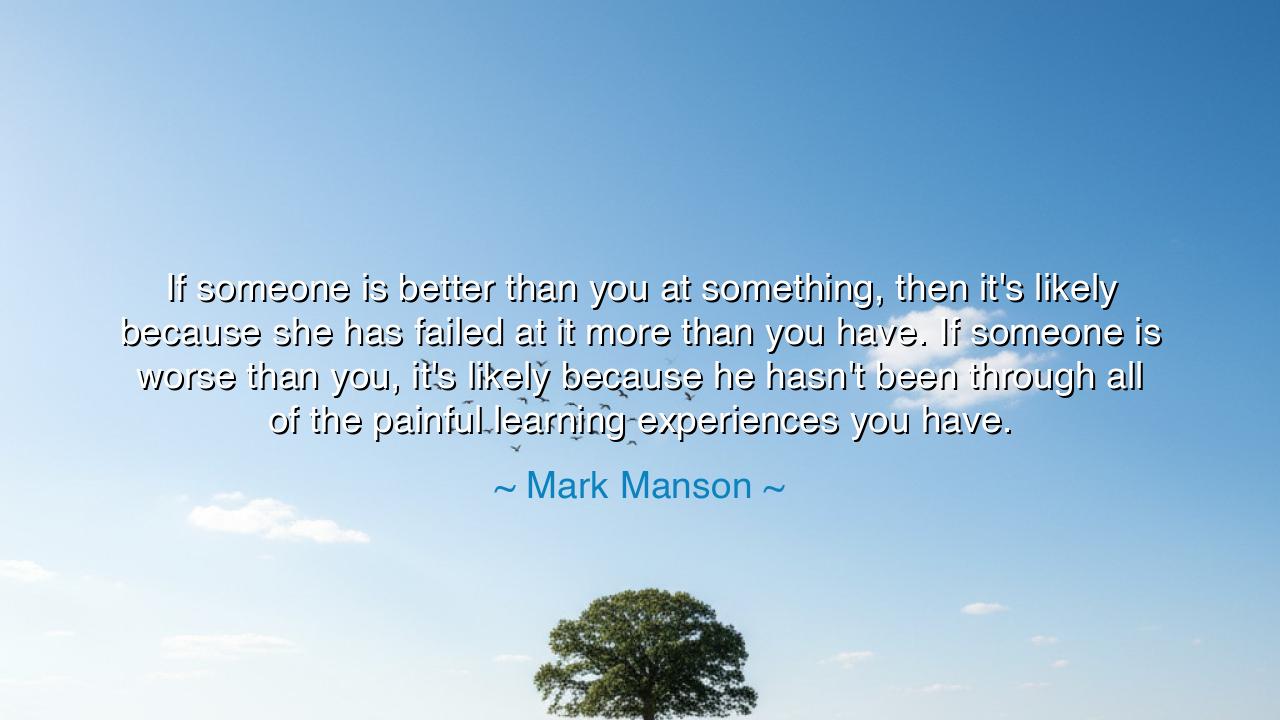
If someone is better than you at something, then it's likely
If someone is better than you at something, then it's likely because she has failed at it more than you have. If someone is worse than you, it's likely because he hasn't been through all of the painful learning experiences you have.






“If someone is better than you at something, then it’s likely because she has failed at it more than you have. If someone is worse than you, it’s likely because he hasn’t been through all of the painful learning experiences you have,” said Mark Manson, a modern philosopher of humility and truth. Beneath these words lies an ancient principle — that mastery is born not from talent alone, but from struggle; that greatness does not bloom in comfort, but in the soil of repeated failure. His teaching reminds us that what we call excellence is not the absence of mistakes, but the persistence that transforms them into wisdom.
In these words, Manson shatters the illusion of effortless success. The one who stands above you in skill has not simply been blessed by fortune — she has walked longer through the valley of defeat, fallen more times, and risen again when others stayed on the ground. The marks of mastery are invisible scars — each mistake, each disappointment, each attempt a stroke in the sculpture of growth. To envy the master is to ignore the fires that forged her. To despise the beginner is to forget one’s own first trembling steps. Thus, Manson’s truth is not about comparison, but about reverence — reverence for the journey, for the pain that births progress.
The ancients knew this lesson well. The philosopher Aristotle once said that excellence is not an act, but a habit — a repetition. And repetition is the twin of failure, for to repeat is to err again and again until understanding dawns. Even the greatest warriors of old, like Miyamoto Musashi, the undefeated samurai, learned through defeat. He was not born a master of the sword; he began as a reckless youth who swung wildly, lost duels, and bled from his mistakes. Yet each wound became a teacher, each failure a whisper of refinement, until the day came when he no longer fought his opponents, but his own imperfection.
The same pattern lives in every art, every science, every craft of the spirit. The painter who holds the brush with ease has destroyed a thousand failed canvases. The poet who moves hearts has written a hundred verses that never sang. The leader who commands trust has first endured betrayal and doubt. The painful learning experiences Manson speaks of are not obstacles upon the path — they are the path. Without them, no human soul can grow deep or resilient. For failure, though bitter, is the truest mentor: she teaches without comfort and rewards only those who endure.
Consider the story of Thomas Edison, whose thousand failed experiments birthed the light that banished darkness. When asked how he could bear so much defeat, he replied, “I have not failed. I’ve just found ten thousand ways that won’t work.” His words echo Manson’s truth: that every person who surpasses others in skill has simply walked further down the road of failure, refusing to turn back. Each failure, properly met, is a stone laid upon the bridge to mastery.
This truth also carries mercy within it. It teaches us not to judge the inexperienced, for they are still walking their first miles. The child who stumbles is not weak — he is learning to stand. The apprentice who falters is not unworthy — he is being shaped. And the wise, remembering their own bruises, guide with patience rather than pride. When Manson says that someone “worse than you hasn’t been through the same painful experiences,” he calls us to compassion — to recognize that skill is not superiority, but survival.
So, O seeker of mastery, take this lesson to heart: failure is not your enemy; it is your sculptor. Do not shrink from mistakes, for they are the fire that tempers your steel. Do not envy the skilled, for their power was purchased through pain. Instead, walk your path with courage. When you fall, rise again, and again, and again — for every fall deepens your wisdom, every setback strengthens your foundation. The master’s grace is not in perfection, but in perseverance.
Thus, remember Mark Manson’s wisdom as the ancients would remember the counsel of oracles: that the measure of your greatness is not how swiftly you succeed, but how faithfully you endure. Honor your failures. Cherish your scars. See in them the proof that you have lived, struggled, and learned. For the doors of mastery open only to those who have knocked upon them with the bruised hands of perseverance — again, and again, and again.






AAdministratorAdministrator
Welcome, honored guests. Please leave a comment, we will respond soon